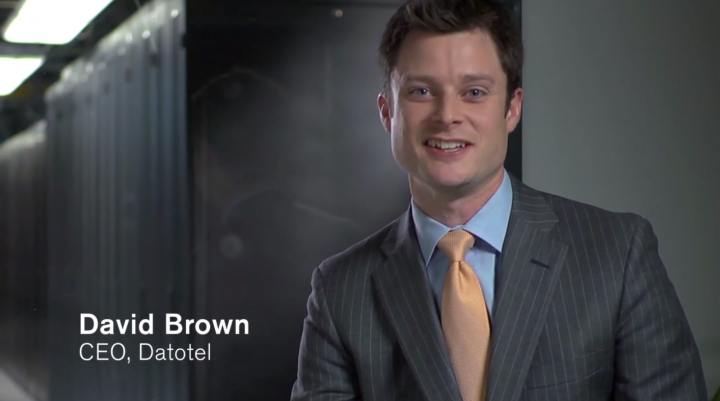It seems the first rule of entrepreneurship is that unless you have a unique – and preferably patented — technology or process, don’t chase a market that’s already saturated with well-known and well-heeled companies.
If David Brown believed in that rule, Datotel, the company he founded in 2004, wouldn’t have made it past the concept stage. Datotel bills itself as a full-service data management company, offering services that range from storing files to cloud computing to managing entire data centers. Sound familiar? The likes of IBM, Pitney Bowes and Xerox have been offering variations on such services for years. How could a small, local company possibly compete? Brown sees small and local as major strengths – and major marketing points.
“We offer small and medium sized companies the kind of customer intimacy that they probably wouldn’t get from huge corporations,’’ he said. “They know who we are and how to reach us.”
Indeed, Datotel – the name is a mash-up of data and hotel – is about as accessible as it gets. Its 43 employees keep the company’s 40,000 square foot data storage facility staffed 24/7. Clients can get access to their files or help with a tech problem day or night. If clients want to simply rent storage space, fine. If they want to sign a three-year contract to manage their data, also fine. If they want help fine-tuning their processes, or upgrading their systems, better still.
“You tell us your budget, we’ll work within it,’’ Brown explains
But Brown knows that whatever the price point, data security is paramount. Yes, Datotel has put in energy-monitoring devices that can dim lights in off-peak hours or prod cooling system motors to slow down or rev up in response to ambient temperatures. But no, it does not stint on backup generators, battery systems and such. Moreover, Datotel runs background checks on all its employees, and subjects itself to yearly third-party audits of everything from finances to facility maintenance. Clients can get copies of the reports.
“We lower their costs, but we also reduce their risks,’’ Brown says. “We’re dealing with their data, their prize jewels, we need to give them peace of mind.”
Brown’s company may be high-tech – but he sees his main role as decidedly old-school: maintaining the company culture. His goal is for employees to feel as intimately cared for as clients.
Kudos for jobs well done come via handwritten notes, not emails. Birthday cards are sent via snail mail. And don’t expect PowerPoint presentations at quarterly staff meetings. One recent meeting took the form of an “Amazing Race” type challenge, with teams making stops at various places in downtown St. Louis, with a manager giving them a morsel of data about company goals at one stop, and another asking them questions about clients or strategies at another. Another was a makeshift “bubble soccer” party where everyone got sheathed in big bubbles and went bouncing against each other.
“Having fun is a big part of the culture here,’’ Brown says.
Brown, just 36, seems to be having a ball himself – a pretty lucky outcome, considering he got into this business as much by serendipity as by plan.
Brown, a native of Scotland and immigrant to the US, always expected to be a chief information officer for some mega-company. He got a degree in electrical engineering and computer science from Heriot-Watt University in Edinburgh, and went to work for Oracle, helping various UK clients on technology projects. When BP and Amoco merged in the late 1990s, Oracle sent Brown to Cleveland, then Chicago, to help the companies integrate their computer systems. Then it was off to Washington, D.C. for another client.
The traveling was fun, except for one thing: Brown had fallen in love with a woman in Chicago, and the commuting relationship was a drag. She moved back to St. Louis, her hometown. Brown followed in 2002, and enrolled in Washington University. By 2003 he had a masters in computer science; by 2004 he had an MBA.
He also had a problem. His ardor for a CIO spot had dimmed, replaced by a fascination with mergers and acquisitions and venture capital. The best jobs in those fields were located on the east and west coasts. He was married by then, and happily settled in St. Louis. What to do?
His father-in-law, who runs a real estate business in St. Louis, provided the answer. He gently prodded Brown to buy a bankrupt data center whose owner had fallen victim to the dot-com bust. Brown also snapped up a small data consulting company, along with its clients. Datotel was off and running. Today, Datotel is one of several success stories in the burgeoning St. Louis startup and entrepreneurs scene.
Brown has picked up a few Chicago clients, and recently opened a small data center there. And he’s exploring ways to get Datotel involved in securing data on laptops and smartphones. But no matter how much Datotel grows, he has every intention of keeping its headquarters in St. Louis.
“The cost of real estate and power is so much cheaper here,’’ he says.
But probably more important, he just likes the place.
“This is a big small town, or a small big town,’’ he says. “It’s easy to make connections with people, to mentor and be mentored. I can’t say I wouldn’t get that in another city – but I know I get it here.”







